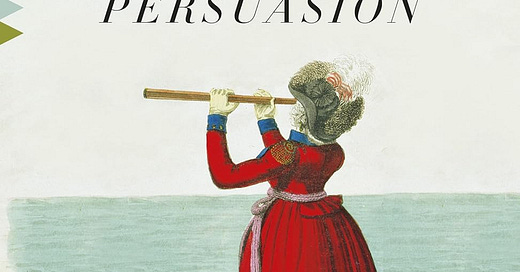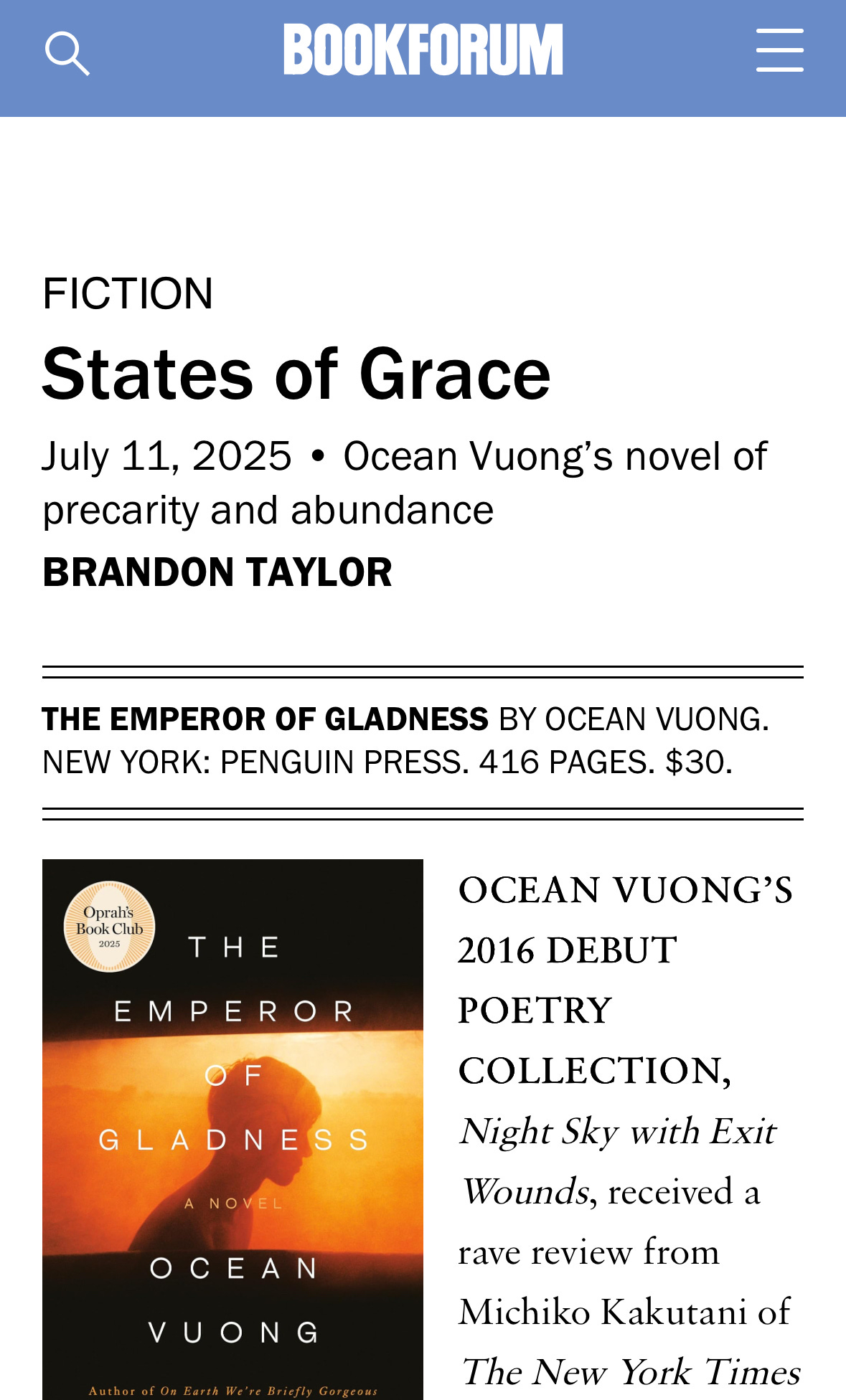Hello friends—
I wanted to share some recently published pieces—why is it that I only seem to publish things in the summer?
Time published an excerpt from my introduction to Vintage’s reissue of Persuasion. This was a bit of a full circle moment for me for a few different reasons. Vintage’s Persuasion was the first copy of the book I bought back when I was living in Madison, Wisconsin, working on a PhD in biochemistry that I abandoned to write gay novels. I still remember that iconic red dress on the cover. It’s a little surreal that there’s a version of that cover with my name on it ten years after I first read it.
Yet, the novel, like life, persists. Anne goes along, serving her family, playing music at the gatherings at Uppercross, where she is much loved by the Musgroves, the family into which her sister Mary married, being a companion to Lady Russell, and serving as a dispenser of practical and good advice. And one day, Wentworth returns, unexpectedly, and she must contend both with old feelings and a new understanding of what her actions did to his life, too. In Persuasion, we have a novel about what happens when you survive the event of your life and must go on living anyway. Who hasn’t made a choice that we wish we could take back? Who hasn’t had to face the cold, harsh light of the morning after and realize, with horrifying clarity, that we’ve made the wrong call? There is shockingly little literature about not just that moment but the life that follows. This is partly because regret tends to be hard to dramatize, at least in a way that is not boring or bad.
I won’t write another introduction in this newsletter—though I am sorely tempted because has a person ever really truly said everything they want and need to say about Jane Austen—and I hope you’ll pick up a copy of the edition. But I will only add that for a long time, my favorite Jane Austen novel was Sense and Sensibility. It’s just such a fun novel with an incredibly profound depth to it. But as I have gotten older, and as I have spent more time with Mansfield Park and Persuasion, I find myself able to access more of those novels. As a result, I think, at this moment, Persuasion might be my favorite Jane Austen novel. It is certainly, in my opinion, the best Jane Austen novel. But what has surprised me most over the last few years is that I have come to view Mansfield Park as a close rival to Persuasion in terms of depth and the dramatization of Austen’s philosophical and ethical interests.
Over at Bookforum, I reviewed Ocean Vuong’s new novel The Emperor of Gladness. I was anxious about taking on another review assignment because of all of the trouble I got into last summer when I reviewed Rachel Kushner and Sally Rooney. Particularly the Rooney review, which I thought was very positive. People got so mad, including some hack TV writer who was pedaling his debut novel. He got online and made people think I had panned Rooney, when in fact I had not. It was all very tiresome and stupid, and I do not wish that guy well. In fact, I hope he flops for the rest of his life. But anyway, when the editor asked me if I’d review the new Vuong, I thought two things: one, this is perhaps the only way I will read that novel, and two, if I read that novel and review it, I will probably get fired.
You can read the review for yourself. I won’t re-litigate its claims here. But maybe I can share a little bit about how I approached it. There are a lot of tropes when it comes to reviewing Vuong’s writing. I knew that I didn’t want to just list all of the sentences that were not to my taste. I didn’t want to write a scathing excoriation of his aesthetic. The fact of the matter is that you cannot shame Ocean Vuong into having good taste. You just can’t. He is who he is. The people who love him and his work love him and his work because he is who he is, not despite the fact that he is who he is as a writer.
You can quarrel with it all you want, but the fact of the matter is that his work is the product of a concerted aesthetic operation that cannot be coerced or corrected. You just can’t. So, there’s no point. You can scream and shout and decry the degradation of aesthetic judgement all you like, my friends. You can keen and wallow and bemoan the sentimentality, the coarse technique, all of that stuff. That won’t change the fact that he’s doing it on purpose and doing it because he likes it, and also doing it because thousands of people, tends of thousands, perhaps even hundreds of thousands of people, love it. Now, we can ask should they? But that is a question about how we think people should live and arrange their lives, not a question about the quality of the book.
Instead, I decided to try to take his aesthetic seriously. I wanted to crawl inside of it and ask what is it about these sentences that feels so weird to me. So creaky in their technique. Are there instances where it works. Instances where it doesn’t. I wanted to understand how his worldview plays out at the level of style and how the style affects the depiction of reality. In other words, I took him at his word and took the book at its word and tried to judge it according to that rather than getting caught up in how I think things ought to be.
You can read the review and see if I succeeded or failed at that.
Also, I didn’t write this, but at Kirkus Reviews, my novel Minor Black Figures got a starred review. It’s kind of amazing to me! I thought for sure they would hate it. But in fact, they said very generous things that made me feel quite seen and comprehended, as if the book I’d actually succeeded in some small measure to write the book I set out to write. If I have any teensy quibble, it’s that they say “young love” when in fact these characters are in their thirties.
I have a theory about why people keep using the word “young” about my characters and my work even as my characters have aged into their mid-thirties. I think it’s because they’re gay millennials and live the kind of provisional lives that a lot of gay people in their thirties live. They don’t own homes. They aren’t married. They don’t have children. They don’t have pets. They have kind of precarious jobs. In short, they haven’t turned into the sort of people that society recognizes as “adult.” If my characters were married (gay or otherwise) and had children, these reviewers would stop using the word “young” immediately. But the fact of the matter is, I am not going to be writing about gay marriage or longterm relationships for probably a very long time. So, then, what happens when I start writing people who are forty-two and are still artists or people who work at a deli or in a homewares store, and still not married and still don’t have children. Will people still call them young then?
This might be an aspect of being an aging millennial. But adulthood does not look the same for me and my vast numbers of my age cohort as it looked for generations past. My characters are not old, no, and perhaps they seem young from a more proximal settled province of adulthood and domesticity, but, also, they are adults. They are grown. They have grown people problems. Taxes. Jobs. Debt. Rent. For millennials, precarity is not the state of youth. It is our primary state of life.
I will probably write something long and boring about this in the future, but I am fascinated by the persistence in the word young as it applies to my work. I’ve taken to putting my characters’ ages front and center in my stories now so that people know they are talking about someone approaching the beginning of middle age and not a twenty-five-year-old. But even that has been ineffective, largely because of the structures of my characters’ lives. But also maybe people don’t even notice that they’re doing it.
Anyway, if you want to read a book about the youngly middle-aged, an artist and a priest who have too much sex and watch a lot of Rohmer movies, then I have the book for you.
b






wondering about how often “young” is a euphemism for “not rich” in a way that preserves the idea that we all become rich eventually
As a 60 y.o. who’s worked in cafes and small shops for the last ten years, I’m one of the “youngly late-middle-aged,” I guess! Indeed I have found myself consistently surprised to learn that all my coworkers and bosses are younger than me, if only because 12 years of living in Paris have left an indelible sense of hierarchy (or convenient dissonance?) upon my perception of age and rank — yes, I see my bosses as older than me because they’re accomplished and in charge, and yes, I perceive my coworkers as about the same age as me because they’re just as broke and financially precarious as I am. Age might just be more of a financial construct than we think. Even with health considerations — I’m healthier than a lot of people younger than me, even if they have better eyes and feet than me. So, I’ll love reading about your older deli-workers and artists without children and homes.
Anyway, you’ve inspired me to re-read Persuasion again. Thank you!